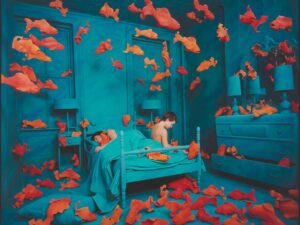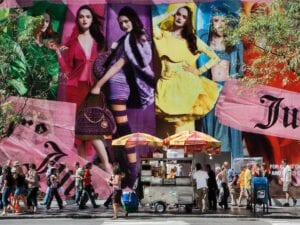Aphasia occurs when a person has difficulty with communication or speech. It is often caused by a stroke, head injury or neurological conditions, when damage occurs to parts of the brain that are responsible for understanding and producing words. The loss of language is the starting point for Italian Senegalese artist Adji Dieye’s (b. 1991) latest video, Aphasia. The speech-based performance sees the artist travel across Dakar as she attempts to express herself in French – a tongue steeped in historical resonance. It was imposed in Senegal whilst the country was under colonial rule between 1817 and 1960. It remains the territory’s official language – used in business, education and politics. Despite this, only parts of the population can understand its institutional form and Wolof is the most widely spoken vernacular.

Dieye draws attention to this sense of disconnect by reading excerpts of presidential speeches, written in French, that have been broadcast since the Republic of Senegal’s independence. “Of key concern here is the question of how a country that once lived under colonial rule – and whose archives are still influenced by it in terms of their structure and language – can develop a postcolonial identity,” explains curator Katrin Bauer. Another significant observation is the consequences of urban growth. There has been swift development in the last six decades due to an increasing population in the capital. Cranes and empty buildings become stages for exchange. As the film’s backdrops changes, so too does its soundscape. The artist’s tone eventually merges into multiple voices – a polyphonic landscape of collaborators of Afro-diasporic and Senegalese heritage. In this way, people are transformed into living archives.
Fotomuseum Winterthur 25 February – 29 May
Words: Eleanor Sutherland
Image Credits: Adji Dieye, video stills from Aphasia, 2022 © Adji Dieye





